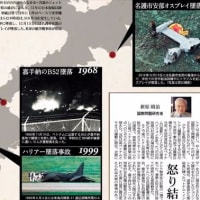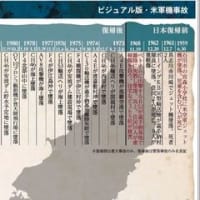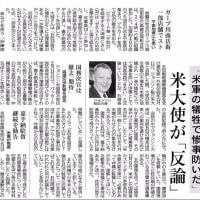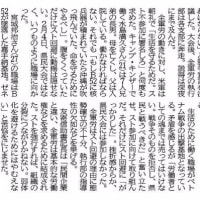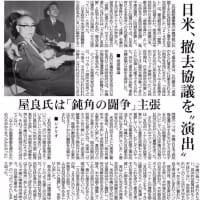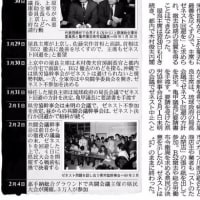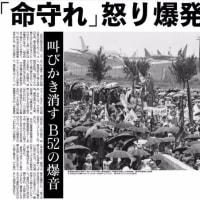イスラエル政府は、ガザ民間人無差別攻撃を容認推奨した軍国際法顧問Pnina
Sharvit-Baruchをテルアヴィヴ大学の教員に任命しました。これに対して、イス
ラエル内部でも批判の声が上がりました。特に、Haim Ganz教授が、Sharvit-
Baruchの法解釈は国際法を弛緩させ、大量殺害を許すものだと批判しました。と
ころが、Zvi Galil学長は、任命を歓迎。イスラエルでは、もともと大学と軍隊
が密接な協力関係にあります。ヘブライ大学のミネルヴァ人権センターのDaphna
Golanによると、Ganz教授は逆流にあって沈黙に追い込まれています。戦争犯罪
者が大学で国際法を教えることになりそうです。ラムズフェルドがハーバードで
教えるようなものでしょうか。他方、アメリカの教授グループがイスラエルのア
カデミック・ボイコットを表明しているそうで、同様の動きは、オーストラリ
ア、スペイン、スウェーデン、カナダ、南アフリカ、ニュージーランドにもある
そうですが、詳しいことはわかりません。
Israeli university welcomes ‘war crimes’ colonel
Attacks on Gaza civilians sanctioned by military lawyer
by Jonathan Cook
Global Research <http://www.globalresearch.ca>, February 9, 2009
NAZARETH. The Israeli government has moved quickly to quash protests
over the appointment of the army’s senior adviser on international law
to a teaching post at Tel Aviv University. Col Pnina Sharvit-Baruch is
thought to have provided legal cover for war crimes during the recent
Gaza offensive.
Government officials fear that recent media revelations relating to Col
Sharvit-Baruch’s role in the Gaza operation may assist human rights
groups seeking to bring Israeli soldiers to trial abroad.
A Spanish judge began investigating Israeli war crimes in Gaza under the
country’s “universal jurisdiction” laws this month, and a prosecutor at
the International Criminal Court in The Hague is considering a
Palestinian group’s petition to indict Israeli commanders.
Meanwhile, the furore -- by highlighting the close ties between the army
and Israeli universities -- is adding weight to a growing campaign in
Europe and the US to impose an academic boycott on Israel, say activists.
Tel Aviv University’s decision to hire Col Sharvit-Baruch to teach
international law prompted protests from staff after the local media
published details of the military planning for the Gaza offensive.
More than 1,300 Palestinians were killed during the operation, the
majority of them civilians, and thousands were injured.
According to critics quoted by the Haaretz newspaper, Col Sharvit-Baruch
and her staff manipulated standard interpretations of international law
to expand the scope of army operations to include civilian targets.
Leading the protest is Haim Ganz, a law professor who has called the
colonel’s approach to international law “devious jurisprudence that
permits mass killing”. In a letter to the university, Prof Ganz said he
was lodging “a moral protest against a state of affairs where somebody
who authorised these actions is teaching the law of war”.
Last week Ehud Olmert, the prime minister, threatened to cut government
funding for the law faculty should Col Sharvit-Baruch’s appointment not
proceed. The university’s president, Zvi Galil, phoned the cabinet
secretary to reassure the government, saying Prof Ganz’s opinions were
not shared by most staff.
Other academics have rallied in support of Col Sharvit-Baruch, accusing
her critics of waging a McCarthyite campaign against her.
According to the Israeli media, she personally approved the first wave
of air strikes in Gaza that targeted a police graduation ceremony,
killing at least 40 cadets.
Although police forces have civilian status in international law, and
are therefore protected from military reprisal, Col Sharvit-Baruch is
reported to have revised her opinion of the attack’s legality during the
many months of planning.
In addition, she is said to have “relaxed” the rules of engagement,
approved widespread house demolitions and the uprooting of farmland, and
sanctioned the use of incendiary weapons such as white phosphorus over
the densely populated enclave.
She also offered legal justification for the targeting of buildings in
which civilians were known to be located as long as they had been warned
first to leave. Schools, mosques and a university were among the many
civilian buildings shelled by the Israeli army during the 22-day operation.
Her decisions have been widely criticised by international human rights
organisations as well as by international law experts in Israel.
The professor Yuval Shany, who teaches public international law at
Hebrew University in Jerusalem, called her interpretation of the rules
of war “flexible”. Regarding the strike against the police cadets, he
said: “If you follow that line, there is not much that differentiates
[the cadets] from [Israeli] reservists or even from 16-year-olds who
will be drafted [into the Israeli army] in two years.”
Col Sharvit-Baruch’s predecessor, Daniel Reisner, noted that her staff
had stretched the accepted meanings of international law. The army’s
operating principle, he added, was: “If you do something for long
enough, the world will accept it.”
Orna Ben-Naftali, the dean of law at the College of Management in Rishon
Letzion, said the army’s conduct in Gaza had made international law
“bankrupt”. “A situation is created in which the majority of the adult
men in Gaza and the majority of the buildings can be treated as
legitimate targets. The law has actually been stood on its head.”
But despite the protest at Tel Aviv University, most academic staff in
Israel supported Col Sharvit-Baruch’s appointment, said Daphna Golan, a
programme director at the Minerva Center for Human Rights at Hebrew
University. “I think even Prof Ganz has been frightened into silence by
the backlash.”
The episode, she said, highlighted the intimate relations between the
army and universities in Israel, as well as the dependence of the
universities on army funding.
She noted that there were many special programmes designed to favour
army and security personnel by putting them on a fast track to degrees.
“Most of the professors in the country’s Middle East departments -- the
‘experts on Arabs’ who shape the perceptions of the next generation --
are recruited from the army or the security services,” she added.
Omar Barghouti, a co-ordinator of the Palestinian Campaign for the
Academic and Cultural Boycott of Israel, said Col Sharvit-Baruch’s
employment was a further indication of the “organic ties” between
Israeli institutions and the army.
“This just adds one more soldier to an already very long list of war
criminals roaming around freely in Israeli universities, teaching hate,
racism and warmongering, with impunity,” he said.
He noted that calls for an academic boycott were growing in the wake of
the Gaza offensive.
Al-Quds University, with campuses in East Jerusalem and the West Bank,
severed its contacts with Israeli universities last week. It had been
the last Palestinian university to maintain such ties.
At the same time, a group of US professors announced that they were
campaigning for an academic boycott of Israel -- the first time such a
call has been heard in the US.
Mr Barghouti said an “unprecedented” groundswell of popular opinion was
behind new campaigns in countries such as Australia, Spain, Sweden,
Canada, South Africa and New Zealand.
Jonathan Cook is a frequent contributor to Global Research. Global
Research Articles by Jonathan Cook
<http://www.globalresearch.ca/index.php?context=listByAuthor&authorFirst=Jonathan&authorName=Cook>
************************************
ブログ内GAZA関連記事
Sharvit-Baruchをテルアヴィヴ大学の教員に任命しました。これに対して、イス
ラエル内部でも批判の声が上がりました。特に、Haim Ganz教授が、Sharvit-
Baruchの法解釈は国際法を弛緩させ、大量殺害を許すものだと批判しました。と
ころが、Zvi Galil学長は、任命を歓迎。イスラエルでは、もともと大学と軍隊
が密接な協力関係にあります。ヘブライ大学のミネルヴァ人権センターのDaphna
Golanによると、Ganz教授は逆流にあって沈黙に追い込まれています。戦争犯罪
者が大学で国際法を教えることになりそうです。ラムズフェルドがハーバードで
教えるようなものでしょうか。他方、アメリカの教授グループがイスラエルのア
カデミック・ボイコットを表明しているそうで、同様の動きは、オーストラリ
ア、スペイン、スウェーデン、カナダ、南アフリカ、ニュージーランドにもある
そうですが、詳しいことはわかりません。
Israeli university welcomes ‘war crimes’ colonel
Attacks on Gaza civilians sanctioned by military lawyer
by Jonathan Cook
Global Research <http://www.globalresearch.ca>, February 9, 2009
NAZARETH. The Israeli government has moved quickly to quash protests
over the appointment of the army’s senior adviser on international law
to a teaching post at Tel Aviv University. Col Pnina Sharvit-Baruch is
thought to have provided legal cover for war crimes during the recent
Gaza offensive.
Government officials fear that recent media revelations relating to Col
Sharvit-Baruch’s role in the Gaza operation may assist human rights
groups seeking to bring Israeli soldiers to trial abroad.
A Spanish judge began investigating Israeli war crimes in Gaza under the
country’s “universal jurisdiction” laws this month, and a prosecutor at
the International Criminal Court in The Hague is considering a
Palestinian group’s petition to indict Israeli commanders.
Meanwhile, the furore -- by highlighting the close ties between the army
and Israeli universities -- is adding weight to a growing campaign in
Europe and the US to impose an academic boycott on Israel, say activists.
Tel Aviv University’s decision to hire Col Sharvit-Baruch to teach
international law prompted protests from staff after the local media
published details of the military planning for the Gaza offensive.
More than 1,300 Palestinians were killed during the operation, the
majority of them civilians, and thousands were injured.
According to critics quoted by the Haaretz newspaper, Col Sharvit-Baruch
and her staff manipulated standard interpretations of international law
to expand the scope of army operations to include civilian targets.
Leading the protest is Haim Ganz, a law professor who has called the
colonel’s approach to international law “devious jurisprudence that
permits mass killing”. In a letter to the university, Prof Ganz said he
was lodging “a moral protest against a state of affairs where somebody
who authorised these actions is teaching the law of war”.
Last week Ehud Olmert, the prime minister, threatened to cut government
funding for the law faculty should Col Sharvit-Baruch’s appointment not
proceed. The university’s president, Zvi Galil, phoned the cabinet
secretary to reassure the government, saying Prof Ganz’s opinions were
not shared by most staff.
Other academics have rallied in support of Col Sharvit-Baruch, accusing
her critics of waging a McCarthyite campaign against her.
According to the Israeli media, she personally approved the first wave
of air strikes in Gaza that targeted a police graduation ceremony,
killing at least 40 cadets.
Although police forces have civilian status in international law, and
are therefore protected from military reprisal, Col Sharvit-Baruch is
reported to have revised her opinion of the attack’s legality during the
many months of planning.
In addition, she is said to have “relaxed” the rules of engagement,
approved widespread house demolitions and the uprooting of farmland, and
sanctioned the use of incendiary weapons such as white phosphorus over
the densely populated enclave.
She also offered legal justification for the targeting of buildings in
which civilians were known to be located as long as they had been warned
first to leave. Schools, mosques and a university were among the many
civilian buildings shelled by the Israeli army during the 22-day operation.
Her decisions have been widely criticised by international human rights
organisations as well as by international law experts in Israel.
The professor Yuval Shany, who teaches public international law at
Hebrew University in Jerusalem, called her interpretation of the rules
of war “flexible”. Regarding the strike against the police cadets, he
said: “If you follow that line, there is not much that differentiates
[the cadets] from [Israeli] reservists or even from 16-year-olds who
will be drafted [into the Israeli army] in two years.”
Col Sharvit-Baruch’s predecessor, Daniel Reisner, noted that her staff
had stretched the accepted meanings of international law. The army’s
operating principle, he added, was: “If you do something for long
enough, the world will accept it.”
Orna Ben-Naftali, the dean of law at the College of Management in Rishon
Letzion, said the army’s conduct in Gaza had made international law
“bankrupt”. “A situation is created in which the majority of the adult
men in Gaza and the majority of the buildings can be treated as
legitimate targets. The law has actually been stood on its head.”
But despite the protest at Tel Aviv University, most academic staff in
Israel supported Col Sharvit-Baruch’s appointment, said Daphna Golan, a
programme director at the Minerva Center for Human Rights at Hebrew
University. “I think even Prof Ganz has been frightened into silence by
the backlash.”
The episode, she said, highlighted the intimate relations between the
army and universities in Israel, as well as the dependence of the
universities on army funding.
She noted that there were many special programmes designed to favour
army and security personnel by putting them on a fast track to degrees.
“Most of the professors in the country’s Middle East departments -- the
‘experts on Arabs’ who shape the perceptions of the next generation --
are recruited from the army or the security services,” she added.
Omar Barghouti, a co-ordinator of the Palestinian Campaign for the
Academic and Cultural Boycott of Israel, said Col Sharvit-Baruch’s
employment was a further indication of the “organic ties” between
Israeli institutions and the army.
“This just adds one more soldier to an already very long list of war
criminals roaming around freely in Israeli universities, teaching hate,
racism and warmongering, with impunity,” he said.
He noted that calls for an academic boycott were growing in the wake of
the Gaza offensive.
Al-Quds University, with campuses in East Jerusalem and the West Bank,
severed its contacts with Israeli universities last week. It had been
the last Palestinian university to maintain such ties.
At the same time, a group of US professors announced that they were
campaigning for an academic boycott of Israel -- the first time such a
call has been heard in the US.
Mr Barghouti said an “unprecedented” groundswell of popular opinion was
behind new campaigns in countries such as Australia, Spain, Sweden,
Canada, South Africa and New Zealand.
Jonathan Cook is a frequent contributor to Global Research. Global
Research Articles by Jonathan Cook
<http://www.globalresearch.ca/index.php?context=listByAuthor&authorFirst=Jonathan&authorName=Cook>
************************************
ブログ内GAZA関連記事










